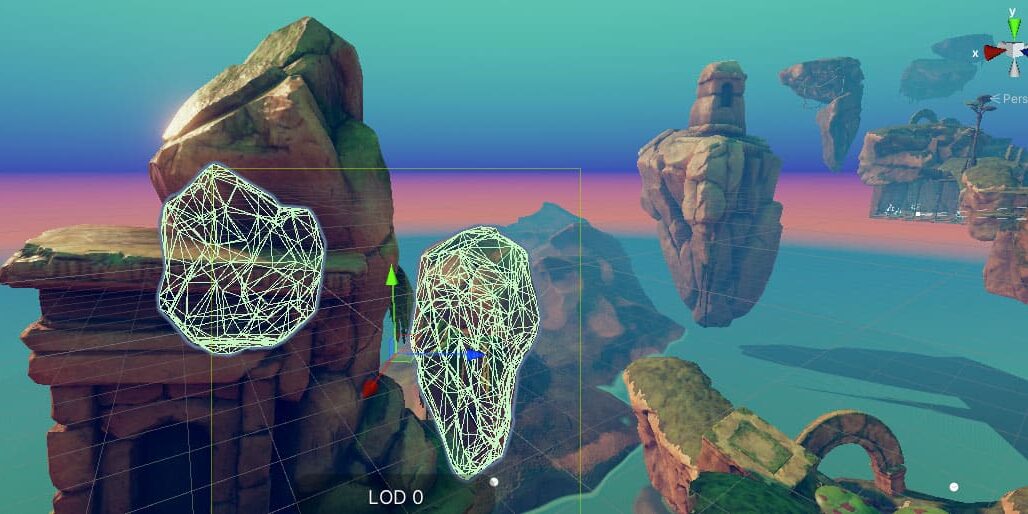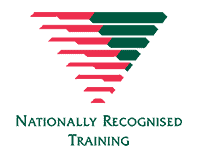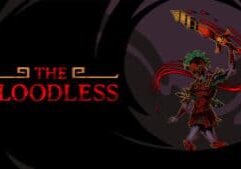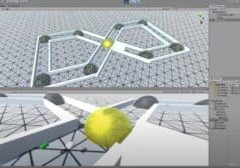Game Engine Scripting Foundations
Certificate II in Applied Digital Technologies ICT20120
Game Engine Scripting Foundations teaches students how to program using Unreal Engine's node-based programming script called blueprints and is designed to introduce students to the many career opportunities available for programmers in games, interactivity and creative industries.
Modules of study introduce students to the fundamentals of games design and development. This course of study allows students to gain an understanding of games programming using the Unreal Engine's blueprinting script, one of the world's most popular and widely-supported game engines. The course is intended to give participants an understanding of skills and techniques necessary to create a range of fun, playable games.
Game Engine Scripting Foundations features an Project where students work together to produce a unique game of their own design. Students undertake the game development cycle from design, pitching, completing set milestones, quality assurance and final presentation.
Game Engine Scripting Foundations serves as a valuable bridge to further study in games programming, such as games programming at Advanced Diploma level. Graduates of the Certificate II are also equipped with broad knowledge and skills which are increasingly in demand in multimedia, interactive-technology and many other IT-related areas.
Course Fees and Start Dates
Please see course start dates and associated fees below.
Please note: VET in School students should see their school’s VET Coordinator for fees.
- School Holidays:
- 15 - 19th Apr
- 8 - 12th Jul
- 30 - 4th Oct
- 2024
- 8:45 am - 5:00 pm | 5 days per week
- 3 x 1 week (40 hrs) delivered over consecutive school holiday periods over 1 year
- NSW Board endorsed course delivered ON CAMPUS
- Full Fee: $3260
- Year 10, 11 and 12: $1630
Courses fees include a non-refundable enrolment fee ($65).
- Commencing 21st Jun 2024 2024
- 9:00 am - 3:00 pm | Fri session
- One 6 hour session per week, delivered on Canberra Campus and including Online learners (Blended). ACT school holiday breaks observed.
- Delivered On Campus / Blended
- Half Semester (20 weeks)
ACT Skilled Capital Funding
- :
Fees for Students eligible for Government Funding:
- Gov Subsidised Fee: $100
- Full Fee: $3260
- Year 10, 11 and 12: $1630
Courses fees include a non-refundable enrolment fee ($65).
ACT SKILLED CAPITAL FUNDING FOR TRAINING is available to eligible students living or working in the ACT.
Skilled Capital is an ACT Government training initiative, funded by the ACT and Australian Governments.
The student tuition fees as published are subject to change given individual circumstances at enrolment.
- Commencing 5th Feb 2024 2024
- 5:30 pm - 8:30 pm | Mon, Wed session
- 2 x Evening sessions per week
- Delivered ON CAMPUS
- 1 Semester (20 weeks)
- Full Fee: $3260
- Year 10, 11 and 12: $1630
Courses fees include a non-refundable enrolment fee ($65).
- Commencing 16th Jul 2024 2024
- 5:00 pm - 9:00 pm AEST | Tues, Thu session
- 2 x evening sessions per week (1 week term breaks aligned with ACT holidays)
- Delivered ONLINE
- 1 Semester (15 weeks)
ACT Skilled Capital Funding
- :
Fees for Students eligible for Government Funding:
- Government subsidised: $100
- Full Fee: $3260
- Year 10, 11 and 12: $1630
- Commencing 21st Jun 2024 2024
- 9:00 am - 3:00 pm AEST | Fri session
- One 6 hour session per week, delivered on Canberra Campus and including Online learners (Blended). ACT school holiday breaks observed.
- Delivered ONLINE
- Half Semester (20 weeks)
ACT Skilled Capital Funding
- :
Fees for Students eligible for Government Funding:
- Government subsidised: $100
- Full Fee: $3260
- Year 10, 11 and 12: $1630
Courses fees include a non-refundable enrolment fee ($65).
ACT SKILLED CAPITAL FUNDING FOR TRAINING is available to eligible students living or working in the ACT.
Skilled Capital is an ACT Government training initiative, funded by the ACT and Australian Governments.
The student tuition fees as published are subject to change given individual circumstances at enrolment.
Subjects
Subjects have been designed to consolidate classroom learning while providing practical exposure to common work tasks required of junior game programmers.
Game Scripting Basics
- Identify and apply knowledge of key software programs used in the games industry.
- Use games industry specific software in the creation of video games.
- Demonstrate and apply an understanding of foundational programming concepts.
ICT Foundations
- Apply knowledge of workplace health and safety to identify key personal, policies and procedures and hazards in the workplace.
- Demonstrate knowledge required to work in a manner that is healthy and safe, in relation to self and others, and to respond to emergency incidents.
- Select, configure and use computer operating systems and basic computer hardware.
- Select, install or upgrade basic commercial software applications.
Key Aspects of Game Development
- Identify, select and use game development tools and supporting technologies to produce a video game.
- Incorporate produced data and assets into a video game project.
- Interpret and work to a design brief
Pre-Production Basics
- Measure resources used in game development and implement improvements.
- Reduce the negative environmental impacts of game development.
• Use commercial software packages, including a word-processing and spreadsheet application package.
• Design, create and produce game development pre-production documents.
ICT Security Fundamentals
- Demonstrate knowledge of legislative requirements, organisational policies and procedures, and industry best practice relating to the management of personally identifiable information.
- Apply skills in the secure storage of personally identifiable information in the workplace.
- Demonstrate knowledge and application of information protection protocols.
- Discuss the risks and benefits of cloud computing, and secure and non-secure communication technologies.
Game Production
- Create and maintain a development web blog using a content management system.
- Work and communicate effectively in a team environment.
- Identify, select and utilise methods of digital communication to improve communication and team coordination.
Game Programming News
|
|











